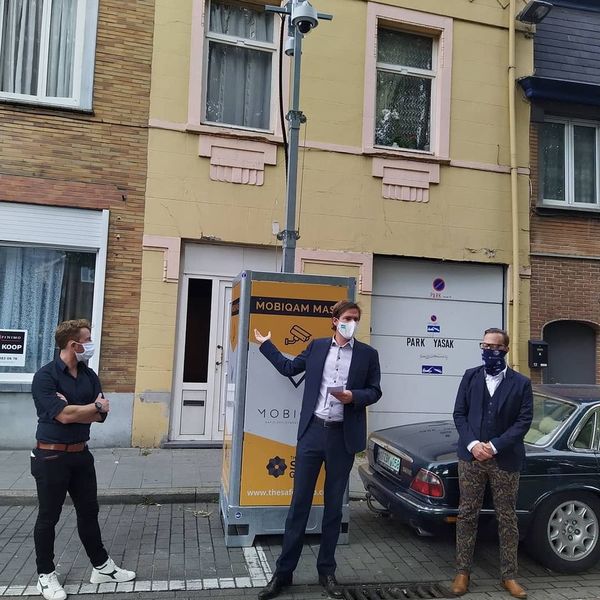Thessaloniki gets ready for its metro launch in November
The underground rapid transit lines have been under construction for almost two decades due to various project delays
 TheMayor.EU logo
TheMayor.EU logo The problem got worse during the coronavirus pandemic
The Police of Ghent installed on Friday the first of five new cameras to control illegal dumping, as reported by the municipality. By doing this, they want to improve the chances of catching perpetrators and prevent the practice, a phenomenon that got even worse in the second-largest Flemish city during the coronavirus pandemic.
Two existing cameras will be replaced by new ones and three extra cameras will be added as part of this investment. Three of the new cameras are 'semi-fixed' and will operate at illegal dumping hotspots - places where there have been many reports about the problem. The cameras are robust, generate their own electricity and can be moved easily. In addition, two mobile cameras will be hidden or concealed, for example in a vehicle or in a house, for observations by the respective police team.

Mayor of Ghent Mathias De Clercq demonstrating the features of the mobile cameras. Photo: Mathias De Clercq on Facebook
The new cameras are only part of the efforts to prevent illegal waste disposal in Ghent, alongside awareness-raising campaigns. Illegal dumping is a major problem in the city which got even worse during the corona crisis.
In addition to Ghent Police, community guards, city employees and Ivago waste-removal company, the city authorities try to ensure every day that everyone deals with waste correctly and that most of the illegal dumping is cleared within two days.
Enforcement is therefore an essential part of the public cleanliness policy. Now, the city invests more in law-enforcement, hoping that the new cameras will make it more likely for the perpetrators to be caught, fined 120 euros and then requested to pay for the clean-up costs. In addition to the use of illegal dumping cameras, catching offenders in the act is also important. Illegal dumps are also observed with the goal of identifying perpetrators.

The underground rapid transit lines have been under construction for almost two decades due to various project delays

Now you can get your wine in Talence by paying directly in Bitcoin

That’s because the state has to spend money on updating the railway infrastructure rather than subsidizing the cost of the popular pass

Rethinking renewable energy sources for the urban landscape

The examples, compiled by Beyond Fossil Fuels, can inform and inspire communities and entrepreneurs that still feel trepidation at the prospect of energy transition

Now you can get your wine in Talence by paying directly in Bitcoin

The 10th European Conference on Sustainable Cities and Towns (ESCT) sets the stage for stronger cooperation between the EU, national and local level to fast track Europe's transition to climate neutrality.

At least, that’s the promise made by the mayor of Paris, Anne Hidalgo

The underground rapid transit lines have been under construction for almost two decades due to various project delays

At least, that’s the promise made by the mayor of Paris, Anne Hidalgo

Hostal de Pinós is located in the geographical centre of the autonomous region

Despite its church-y name, the district has long been known as the hangout spot for the artsy crowds

Urban dwellers across the EU are having a say in making their surroundings friendlier to people and the environment.

Forests in the EU can help green the European construction industry and bolster a continent-wide push for architectural improvements.

Apply by 10 November and do your part for the transformation of European public spaces

An interview with the Mayor of a Polish city that seeks to reinvent itself

An interview with the newly elected ICLEI President and Mayor of Malmö

A conversation with the Mayor of Lisbon about the spirit and dimensions of innovation present in the Portuguese capital














